Present-Perfect-Tense讲解PPT课件
合集下载
初二人教英语现在完成时态课件(共25张PPT)

常见非延续性动词和延续性动词的转变
❖ arrive/come/go to be in
die
be dead
❖ become a
be a borrow
keep
❖ Leave/ move
be away / be out
❖ buy
have open
be open
❖ join
be in/a member of
5. --How many times _h_a_v_e____ you __r_e_a_d___ (read) this book?
❖ --I _h_a_v_e_r_e_a_d_ (read) it several times.
6. My brotherb_ou_g_h_t____ (buy) a car last month.
❖ The twins have joined the army. (since they are 18years old) The twins have been soldiers/ been in the army since they are 18years old.
-- When c_a_m_e_____ she _________ (come)? -- She ________ (come) just now.
I lived there 2 years ago
past
present
I have lived here for two years
❖ 1.都表示过去发生的事 ❖ 2.现在完成时强调过去和现在的联系,不能和具
定回答) He has already finished a story book.
4.He finished reading a story- book. (改成现在完成时)
过去完成时详细讲解PPT课件
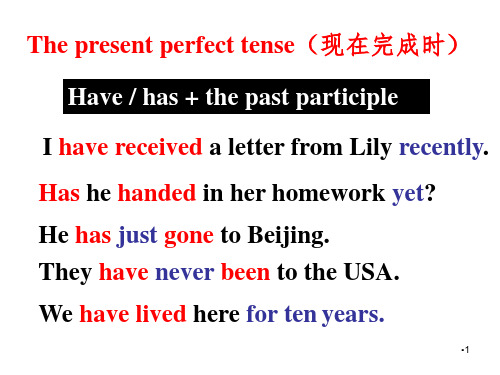
kept
•18
试作比较:
昨天我见到王先生了。自从他离开北京我们就一直未曾见 过面。
• I saw Mr. Wang yesterday. We had not seen each other since he left Beijing.
自从他离开北京我们就一直未曾见过面。
• We have not seen each other since he left Beijing.
到目前为止我已经学会了3000个单词.
I have learned 3000 English words so far / till now.
Mr. Green got up at 6:30 a.m.
Mrs. Green got ready for the breakfast before 6:30 a.m.
Mrs. Green had got
ready for the
breakfast when Mr.
Green got up at 6:30
•13
3)到2005年,我在这工作已经五年了。 By the year 2005, I had worked here for 5years. 试比较:
我在这工作已经五年了。 I have worked here for 5 years. 到目前为止,我在这工作已经五年了。 By now, I have worked here for 5 years. 到上学期末为止,我在这工作已经五年了。
•16
试比较:
2. 在我到家之前,他已经走了。 He had left before I arrived home. 辨别:当我到家的时候,他正准备离开。 He was getting ready to leave when I arrived home.
外研版高中英语Book 1 Module 4 grammar---Present Perfect Tense 教学课件 (共32张PPT)
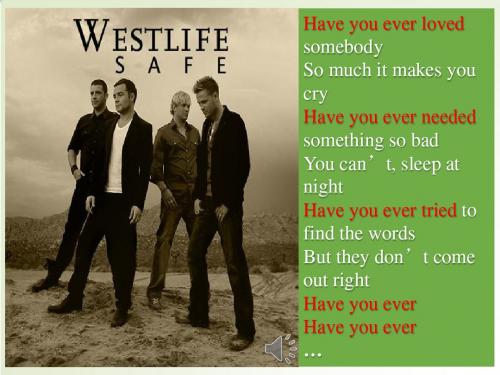
03: Multiple Choice
— D you ______ my glasses?
—Yes, I
them on your bed a minute ago.
A. Did, see, have seen
B. Have, seen, have seen
C. Would, see, saw
D. Have, seen, saw
A. taught
B. have taught
C. are taught
D. have been taught
4. So far this year we _B___ a fall in house prices by between 5 and 10 percent.
A. saw
B. have seen
- I will. I have met
(meet) her several times.
5. His father has been in the Party __s_in_c_e_ 10 years ago.
Homework Multiple choice
1. - These farmers have been to the United States?
• A. has fallen
B. had fallen
• C. is fallingD. was falling
Homework Multiple choice
3. I like these English songs and they _D___ many times on the radio.
01
Have you ever loved somebody So much it makes you cry Have you ever needed something so bad You can’t, sleep at night Have you ever tried to find the words But they don’t come out right Have you ever Have you ever …
外研版高中英语Book 1 Module 4 Grammar---Present Perfect Tense 教学课件(共26张PPT)
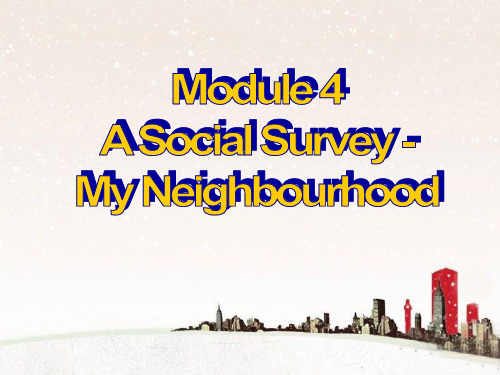
3. 表示动作发生在过去, 并且一直持续 到现在, 甚至还可能继续下去, 句中 使用持续性动词, 且常有表示一段时 间的时间状语。
e.g. We haven’t seen each other for ten years. _我__们__已__经__十__年__没__见__面__了__。
4. 现在完成时可以用在条件或时间状语 从句中, 表示将来某个时刻之前已经完 成的动作。
II. Complete each sentence with one of the verbs below. Use the present perfect tense.
build buy come get live see stay visit
1. They _h_a_v_e_b_u__il_t_ many high-rise buildings in the city.
2. In the last few years, China ___ great
achievements in environmental
protection.
A. has made
B. had made
C. was making
D. is making
3. In my hometown, there is always a
(二) 现在完成时的基本用法 1. 表示动作到现在为止已经完成或刚刚完成。
e.g. _I_h_a_v_e_f_i_n_is_h_e_d__m_y__h_o_m__ew__o_r_k_. 我已经做完作业。
We have set up many new factories _我__们__已__经__建__了__许__多__工__厂__。__
I. 用括号内单词的正确形式完成下面对话。 Mom: What are you doing? Dad: I 1. _a_m__p_l_a_n_n_i_n_g__ (plan) to take the children to the beach this weekend. Mom: That's great! We 2. _h_a_v_e_n_'_t _g_o_n_e (go, not) out for a long time. Dad: Yes. It's been five months since we 3. _h_a_v_e_c_l_im__b_e_d_ (climb) the mountain last time.
高一英语present-perfect-continuous-tensePPT课件
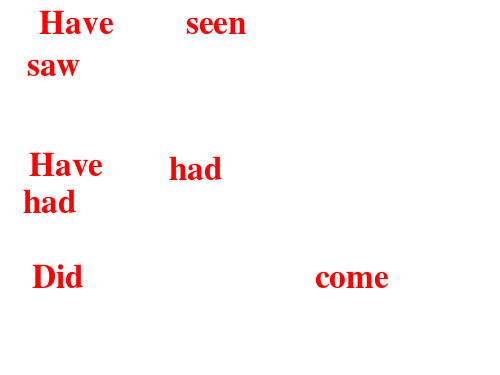
I haven’t been sleeping well since I returned home.
2 talk about actions that have just finished but are still connected to the present in some way. 过去开始的动作刚刚结束,并在某种 情况下与现在有关联。
4 I h__a_v_e_k_n_o_w__n_him for a long time. (know)
5 Hello! I __d_id__n_’t_k__n_o_w_you were here in Nanjing. (not know)
6 How long __h_a_v_e__you __b_e_e_n_here?(be)
; / 聚星娱乐 bgk162utb 钟思当时不免笑着揶揄她“小白白,没想到你居然也会有发奋图强的这一天啊,居然还是为了一个男生! ”
I’m sorry I’m late. Have you been waiting long?
Yes. I have been waiting for an hour.
现在完成时和现在完成进行时的区别
1 都表示动作发生在过去,但现在完 成时表示动作刚结束,但现在完成进 行时则强调动作还将继续下去。
1 We haven’t seen Justin for a week. (He is still missing).
2 It has been very cold lately but it’s just beginning to get warmer.
3 I haven’t seen you for ages. (But I see you now.)
2 talk about actions that have just finished but are still connected to the present in some way. 过去开始的动作刚刚结束,并在某种 情况下与现在有关联。
4 I h__a_v_e_k_n_o_w__n_him for a long time. (know)
5 Hello! I __d_id__n_’t_k__n_o_w_you were here in Nanjing. (not know)
6 How long __h_a_v_e__you __b_e_e_n_here?(be)
; / 聚星娱乐 bgk162utb 钟思当时不免笑着揶揄她“小白白,没想到你居然也会有发奋图强的这一天啊,居然还是为了一个男生! ”
I’m sorry I’m late. Have you been waiting long?
Yes. I have been waiting for an hour.
现在完成时和现在完成进行时的区别
1 都表示动作发生在过去,但现在完 成时表示动作刚结束,但现在完成进 行时则强调动作还将继续下去。
1 We haven’t seen Justin for a week. (He is still missing).
2 It has been very cold lately but it’s just beginning to get warmer.
3 I haven’t seen you for ages. (But I see you now.)
现在完成时完整版本ppt课件

4.Mr Green has worked here _s_in_c_e__ he came to China.
5.His grandpa has been dead __f_o_r__ several years.
.
14
严格执行突发事件上报制度、校外活 动报批 制度等 相关规 章制度 。做到 及时发 现、制 止、汇 报并处 理各类 违纪行 为或突 发事件 。
yet. 3.We __h_a_v_e_ never __s_e_en__ (see) this book
before.
5.Mother __h_a_s_ just _c_le_a_n_e_d_(clean) the house.
6.Sally _h_a_s__vi_s_it_e_d_(visit) China before.
.
18
严格执行突发事件上报制度、校外活 动报批 制度等 相关规 章制度 。做到 及时发 现、制 止、汇 报并处 理各类 违纪行 为或突 发事件 。
举例:
1.我买了这本书五年了。 I have bought this book for five years. ( F ) I have had this book for five years. ( T ) 2.这位老人已经死了十年了。 The old man has died for ten years. ( F ) The old man has been dead for ten years. ( T )
3. He hasn’t returned (not return) the book yet. 三、判断正误:(2分,每题1分)
1.他爷爷已经去世三年了。
His grandpa has died for 3 years.( F) 2. 他去过北京。
现在完成时ppt语法复习课件共44张ppt
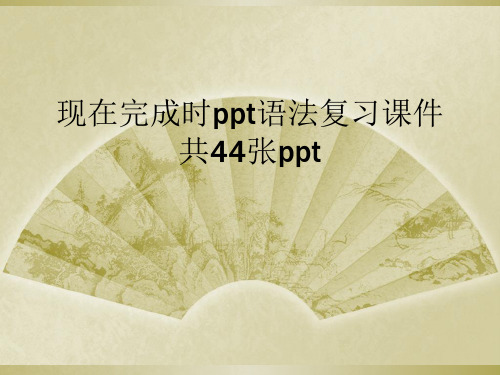
Yes, I have done that already. ⑤ I’ve just finished my homework. ⑥ He has not come yet.
Exercises
• 1. I _h_a_v_e__h_a_d (have) lunch already. • 2. Has the train_a_r_r_i_v_e_d(arrive) yet? • 3.Tom _h_a_s_ never__b_e_e_n__ (be ) to China. • 4. The twin ___h_a_s_justs_e_e_n__(see) my father. • 5. The twins _s_a_w_(see) my father just now. • 6._h_a_v_e__ you ever _ri_d_d_e_n__(ride) a horse? Never.
通常与表示包括现在在内的时间副词 just (谓语动词之前) (刚 刚), already(已经(肯定句) ), before, yet(一般疑问(句 末) :已经;否定句:还) never, ever (疑问句) twice recently(近来)等状语连用
① I have never heard of that before. ② Have you ever ridden a horse? ③ She has already finished the work. ④ Have you milked the cow yet?
8._H_a__s__ he __se__e_n_(see) this film yet? No. When w__il_l __ he __se_e__(see) it? He w__il_l_s_e_eit tomorrow.
Exercises
• 1. I _h_a_v_e__h_a_d (have) lunch already. • 2. Has the train_a_r_r_i_v_e_d(arrive) yet? • 3.Tom _h_a_s_ never__b_e_e_n__ (be ) to China. • 4. The twin ___h_a_s_justs_e_e_n__(see) my father. • 5. The twins _s_a_w_(see) my father just now. • 6._h_a_v_e__ you ever _ri_d_d_e_n__(ride) a horse? Never.
通常与表示包括现在在内的时间副词 just (谓语动词之前) (刚 刚), already(已经(肯定句) ), before, yet(一般疑问(句 末) :已经;否定句:还) never, ever (疑问句) twice recently(近来)等状语连用
① I have never heard of that before. ② Have you ever ridden a horse? ③ She has already finished the work. ④ Have you milked the cow yet?
8._H_a__s__ he __se__e_n_(see) this film yet? No. When w__il_l __ he __se_e__(see) it? He w__il_l_s_e_eit tomorrow.
Present-Perfect-Tense讲解PPT课件

了?
6)这个时态还可表示持续到现在的状态,要使用持续性动词:
• How long has he been ill? 他病了多久了?
• The strike has continued for several weeks. 罢工已持
续了几个星期。
• He has lived here all his life. 他一辈子都住在这里。
- No, not yet. (还没有) • Jane has rung me up three times this morning
already. 简今天早上已给我打过三次电话。
• Have you ever talked to him about it?
你曾和他谈过这事吗?
• Have you seen Lewes recently? 你最近见到过路易斯
years ago. (9) fall ill – have been ill • I fell ill yesterday. • I have been ill for a day / since yesterday. (10) catch a cold – have had a cold • I caught a cold yesterday. • I have had a cold for a day / since yesterday.
• She has found a new job. 她找到了一份新工作。
• We’ve sent some people to help them. 我们已派了几个
人去帮助他们。
• I’m sorry. I’ve broken your cup. 对不起,我把你的杯子打
破了。
• Who has taken my dictionary away? 谁把我的字典拿走
6)这个时态还可表示持续到现在的状态,要使用持续性动词:
• How long has he been ill? 他病了多久了?
• The strike has continued for several weeks. 罢工已持
续了几个星期。
• He has lived here all his life. 他一辈子都住在这里。
- No, not yet. (还没有) • Jane has rung me up three times this morning
already. 简今天早上已给我打过三次电话。
• Have you ever talked to him about it?
你曾和他谈过这事吗?
• Have you seen Lewes recently? 你最近见到过路易斯
years ago. (9) fall ill – have been ill • I fell ill yesterday. • I have been ill for a day / since yesterday. (10) catch a cold – have had a cold • I caught a cold yesterday. • I have had a cold for a day / since yesterday.
• She has found a new job. 她找到了一份新工作。
• We’ve sent some people to help them. 我们已派了几个
人去帮助他们。
• I’m sorry. I’ve broken your cup. 对不起,我把你的杯子打
破了。
• Who has taken my dictionary away? 谁把我的字典拿走
英语教学课件系列 现在完成时 present perfect tense
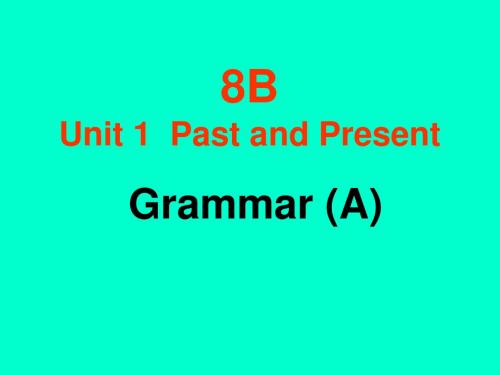
simple past tense and the present perfect tense.
1 Questions about Reading:
• (1) How long has Mr. Chen lived in Sunshine Town?
He has lived in Sunshine Town since he moved there with his family when he was two years old.
2)He hasn’t been to Beijing since then.
I / They/ We / You have (not)
He / She / It
has (not) moved.
has not = hasn’t have not= haven’t
过去分词的构成
Type
original
S: Oh, yes. Iha_v_e__h_e_a_r_d____ (hear) about it._D__id____ your cousin __g_o_ (go) with you?
M : No, he _d_id_n_’_t__.He h_a_s__b_e_en__ (be) very busy this week.
主语(第三人称复数)
+have
主语(第三人称单数)
+has
We have lived in Beijing.
He has lived in Beijing.
I have finished my homework.
+过去分词
2. 现在完成时的否定句
句型 主语+have/has+not+过去分词+…… E.g. 1) I have not seen the movie yet.
1 Questions about Reading:
• (1) How long has Mr. Chen lived in Sunshine Town?
He has lived in Sunshine Town since he moved there with his family when he was two years old.
2)He hasn’t been to Beijing since then.
I / They/ We / You have (not)
He / She / It
has (not) moved.
has not = hasn’t have not= haven’t
过去分词的构成
Type
original
S: Oh, yes. Iha_v_e__h_e_a_r_d____ (hear) about it._D__id____ your cousin __g_o_ (go) with you?
M : No, he _d_id_n_’_t__.He h_a_s__b_e_en__ (be) very busy this week.
主语(第三人称复数)
+have
主语(第三人称单数)
+has
We have lived in Beijing.
He has lived in Beijing.
I have finished my homework.
+过去分词
2. 现在完成时的否定句
句型 主语+have/has+not+过去分词+…… E.g. 1) I have not seen the movie yet.
The Present Perfect Tense 现在完成时 课件 (共22张PPT) 外研

特殊特疑殊问疑句问:词+have/has+主语+done其他?
eg: finish finished
finished
我已经完成了我的家庭作业。
造句 I have finished my homework.
否定 I haven't finished my homework.
一般疑问句 Have you finished your homework? 回答 Yes, I have./No, I haven't. She __h__a_s___ finished her homework.
一般疑问句 Has she finished her homework? 回答 Yes,she has./No,she hasn't.
意义:
1.过去已经发生的动作对现在的影响 eg: I have read this book. eg: Have you found him yet?
2.过去的动作持续到现在且有可能持续下去 eg: I haven't seen her these days. eg: She has lived here for three years. eg: She has taught me for ten years.
区别:have been to/ have gone to/have been in
have been to 去过某地(已回) 【后可加次数】 have gone to 去了某地(未回) have been in 呆在某地多久 + 一段时间
-Where is Jim? -He _h_a__s_g_o__n_e__to__ the library.
现在完成时态演示课件
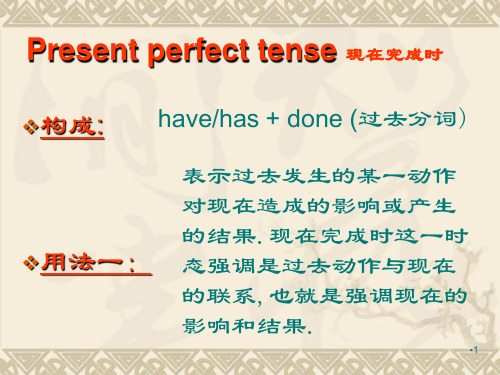
❖
I have seldom watched cartoons these
days.(这几天的情况)
❖
I seldom watch cartoons. (一贯如此)
•8
Adverbs of time
already ever
yet
never
just
these days
recently in the past ten years
× When have you seen him?
When did you see him?
When不与现在完成时连用。它只有过去时 或将来时,因为它表示确切的时间。
•10
❖
用法二:
表示过去某个时间开始的动作 或存在的状态,一直持续到现
在并可能还将持续下去。动词
使用延续性动词。常与for或
since引导的时间连用
•14
have/has gone to have/has been to have/has been in
have/has been in:表示某人“已在某地停留 一段时间,现仍在那里”,其后常带表示 一段时间的状语。 I have been in Britain for then years.
•15
❖ leave
be away
❖ buy
have
❖ join
be in/a member of
❖ start/begin be on
❖ finish/ end
be over
❖ die
be dead
•22
Exercises
❖ His father has died. (for 2 years) His father has been dead for 2 years.
高中英语语法present_perfect_tense现在完成时态优秀公开课课件

• 8.Until now, the Americans have been playing a very delicate political game.
• 9.He hasn’t talked with me for/during/in the last/past few days.
• 10. For/In/During the last/past few years there have been great changes in our town.
take some measures.
3.This is the first time we saw a film in the have seen
cinema together as a family.
4. The population of Jiangsu had grown to has grown
• 现在完成时用法3:表示 刚刚结束的动作, 通常与 just 连用。
• 16.I don’t think you have ever tried talking with Gleed, have you?
• 17.They have never had anything spare-they’ve always used it all.
I _____________ honey lips Felt the healing in her fingertips It burned like a fire This burning desire I _____________ with the tongue of angels I _____________ the hand of a devil It was warm in the night I was cold as a stone But I still _____________ what I'm looking for But I still _____________ what I'm looking for
• 9.He hasn’t talked with me for/during/in the last/past few days.
• 10. For/In/During the last/past few years there have been great changes in our town.
take some measures.
3.This is the first time we saw a film in the have seen
cinema together as a family.
4. The population of Jiangsu had grown to has grown
• 现在完成时用法3:表示 刚刚结束的动作, 通常与 just 连用。
• 16.I don’t think you have ever tried talking with Gleed, have you?
• 17.They have never had anything spare-they’ve always used it all.
I _____________ honey lips Felt the healing in her fingertips It burned like a fire This burning desire I _____________ with the tongue of angels I _____________ the hand of a devil It was warm in the night I was cold as a stone But I still _____________ what I'm looking for But I still _____________ what I'm looking for
初中现在完成时讲解(完整版)ppt课件

He has stayed here since 5 hours ago. 3)since+ 从句
She has taught English since he came here.
for: (长达)
for+ 时间段
He has kept the book for 2 weeks.
完整最新版课件
15
完整最新版课件
4
现在完成时的结构
主语 + have/ has + 过去分词(pp)
注:主语若是第三人称单数助动词用 has
否定形式 haven’t ( have not ) +过去分词 hasn’t ( has not ) +过去分词
疑问句 把助动词 have / has 放在句首
完整最新版课件
5
• 5. I __________ (work) here since I ______ (move) here in 1999.
• 6. So far I _______________(make) quite a few friends here.
• 7. How long ________ the Wangs ______________(stay) here ? For two weeks.
take—took—taken speak —spoke—spoken sing—sang—sung drive—drove—driven be—was/were—been go—went—gone
完整最新版课件
9
4、不规则变化(A-A-A)
cut—cut—cut put —put—put let—let—let read—read—read
教学课件:The Present Perfect Tense

A. has been to B. has gone to C. has been in
3.--____ you ever _B___ to the US?
-- Yes, twice.
A. Have, gone B. Have, been C, Do, go D. were, going
Go back home! 一般过去时 VS 现在完成时
He has been to America for 10 years. ×
He has been in America forБайду номын сангаас10 years. √
/ since 10 years ago.
Tip 1
词组
have/has gone to
含义
到某地去了,表示 到了某地或正在去 某地的途中。说话 时该人不在现场
Review of The Present Perfect Tense
(现在完成时复习)
ZhangLinying Zhaoyang middle school
定义
现在完成时 结构
句式
1.___________________________ 2.___________________________ ___________________________
-- Sorry. He _B_____ the Park.
A. has been to B. has gone to C. went to D. will go to
2.Lucy _C____Qingdao for 20 years. She considers it as her
second hometown.
yesterday last week How happy we are! What a beautiful world!
3.--____ you ever _B___ to the US?
-- Yes, twice.
A. Have, gone B. Have, been C, Do, go D. were, going
Go back home! 一般过去时 VS 现在完成时
He has been to America for 10 years. ×
He has been in America forБайду номын сангаас10 years. √
/ since 10 years ago.
Tip 1
词组
have/has gone to
含义
到某地去了,表示 到了某地或正在去 某地的途中。说话 时该人不在现场
Review of The Present Perfect Tense
(现在完成时复习)
ZhangLinying Zhaoyang middle school
定义
现在完成时 结构
句式
1.___________________________ 2.___________________________ ___________________________
-- Sorry. He _B_____ the Park.
A. has been to B. has gone to C. went to D. will go to
2.Lucy _C____Qingdao for 20 years. She considers it as her
second hometown.
yesterday last week How happy we are! What a beautiful world!
- 1、下载文档前请自行甄别文档内容的完整性,平台不提供额外的编辑、内容补充、找答案等附加服务。
- 2、"仅部分预览"的文档,不可在线预览部分如存在完整性等问题,可反馈申请退款(可完整预览的文档不适用该条件!)。
- 3、如文档侵犯您的权益,请联系客服反馈,我们会尽快为您处理(人工客服工作时间:9:00-18:30)。
Present Perfect Tense
1
1 现在完成时的基本用法: 1)现在完成时表示一件已发生的事,这事往往与现在的情况有联
系:
• I’ve lost my key. 我的钥匙丢了。(因此无法进屋)
• She’s gone to town. 她进城去了。(现在在城里)
• I’ve got a letter from my aunt. 我收到姨母的一封信。(因
7
注意:
1)when,what time常用于一般过去时,问具体的过去时间,不 能用在现在完成时:
• - When did you get back?
- I got back last week.
• - How long have you been back? - I’ve been back for a week.
到现在为止他在学校表现很好。
• Up to / till now, the work has been easy.
到现在为止,这工作还算容易。
• I’ve seen little of her in the past ( last) few years.
过去几年中我很少见到她。
注意: in the last/past + time 用于现在完成时
4
4)还常和for及since 引导的状语或与how long 连用: • I haven’t seen you for ages. 我好久没见到你了。 • He hasn’t cleaned his room for months. 他有好
几个月没打扫这房间了。
• We’ve lived here for over ten years. 我们在这里住
• She has found a new job. 她找到了一份新工作。
• We’ve sent some people to help them. 我们已派了几个
人去帮助他们。
• I’m sorry. I’ve broken your cup. 对不起,我把你的杯子打
破了。
• Who has taken my dictionary away? 谁把我的字典拿走
此知道她的近况)
• The lift has broken down. 电梯坏了.(因此我们得爬楼梯)
• Peter has had a bad car crash. 彼得除了严重车祸。(可
能送医院了)
• I’ve washed my car. 我洗过车了。(因此很干净) • He hasn’t come back yet. 他还没回来。(我们还在等他)
- No, not yet. (还没有) • Jane has rung me up three times this morning
already. 简今天早上已给我打过三次电话。
• Have you ever talked to him about it?
你曾和他谈过这事吗?
• Have you seen Lewes recently? 你最近见到过路易斯
吗?
• He still hasn’t finished his work. 他的工作还没干完。 • There have been some changes lately. 近来有些变化。
3
3)也可和表示从过去某时到现在这段时间的状语连用: • I haven’t seen him today. 今天我没见过他。 • How many letters have you received this week? 这星
了十多年了。
• He has worn glasses since his childhood. 他从
小就戴眼镜。
• Has he written since he left home? 他离家之后来
过信吗?
• How long have you known her? 你认识她多久了?
5
5)也常常单独使用不需任何状语:
2)有些动作(显然是过去的动作),尽管没有时间状语,仍用过去 时:
• We’ve been good friends since we were children. 我
们从小就要好。
6
2 现在完成时与一般过去时的比较 1)两个时态都谈已发生的事,差别在于现在完成时表示的
动作与现在有关系,或是对现在有影响,或谈从过去到现 在这一段时间里发生的事;一般过去时单纯谈过去的事, 与现在没有关系。
注பைடு நூலகம்:
1)when,what time常用于一般过去时,问具体 的过去时间,不能用在现在完成时:
2)有些动作(显然是过去的动作),尽管没有时 间状语,仍用过去时:
Extra: Who washed the car? Who has washed the car? I read the story before. I have read the story.
• - Have you had your supper yet? (你吃饭了吗?)
- Yes, I have. 吃过了(不饿了) 2
2) 常与just, already, yet, still, recently, lately (最 近), over 这类副词连用:
• He’s just left. 他刚走。 • - Has he phoned you yet? (他给你打电话了吗?)
期你收到多少封信?
• They have turned out over 1,000 cars this month.
这个月他们生产了一千多辆汽车。
• He has made several trips to Paris this year. 今年他
去过几趟巴黎。
• So far he has done very well at school.
了?
6)这个时态还可表示持续到现在的状态,要使用持续性动词:
• How long has he been ill? 他病了多久了?
• The strike has continued for several weeks. 罢工已持
续了几个星期。
• He has lived here all his life. 他一辈子都住在这里。
1
1 现在完成时的基本用法: 1)现在完成时表示一件已发生的事,这事往往与现在的情况有联
系:
• I’ve lost my key. 我的钥匙丢了。(因此无法进屋)
• She’s gone to town. 她进城去了。(现在在城里)
• I’ve got a letter from my aunt. 我收到姨母的一封信。(因
7
注意:
1)when,what time常用于一般过去时,问具体的过去时间,不 能用在现在完成时:
• - When did you get back?
- I got back last week.
• - How long have you been back? - I’ve been back for a week.
到现在为止他在学校表现很好。
• Up to / till now, the work has been easy.
到现在为止,这工作还算容易。
• I’ve seen little of her in the past ( last) few years.
过去几年中我很少见到她。
注意: in the last/past + time 用于现在完成时
4
4)还常和for及since 引导的状语或与how long 连用: • I haven’t seen you for ages. 我好久没见到你了。 • He hasn’t cleaned his room for months. 他有好
几个月没打扫这房间了。
• We’ve lived here for over ten years. 我们在这里住
• She has found a new job. 她找到了一份新工作。
• We’ve sent some people to help them. 我们已派了几个
人去帮助他们。
• I’m sorry. I’ve broken your cup. 对不起,我把你的杯子打
破了。
• Who has taken my dictionary away? 谁把我的字典拿走
此知道她的近况)
• The lift has broken down. 电梯坏了.(因此我们得爬楼梯)
• Peter has had a bad car crash. 彼得除了严重车祸。(可
能送医院了)
• I’ve washed my car. 我洗过车了。(因此很干净) • He hasn’t come back yet. 他还没回来。(我们还在等他)
- No, not yet. (还没有) • Jane has rung me up three times this morning
already. 简今天早上已给我打过三次电话。
• Have you ever talked to him about it?
你曾和他谈过这事吗?
• Have you seen Lewes recently? 你最近见到过路易斯
吗?
• He still hasn’t finished his work. 他的工作还没干完。 • There have been some changes lately. 近来有些变化。
3
3)也可和表示从过去某时到现在这段时间的状语连用: • I haven’t seen him today. 今天我没见过他。 • How many letters have you received this week? 这星
了十多年了。
• He has worn glasses since his childhood. 他从
小就戴眼镜。
• Has he written since he left home? 他离家之后来
过信吗?
• How long have you known her? 你认识她多久了?
5
5)也常常单独使用不需任何状语:
2)有些动作(显然是过去的动作),尽管没有时间状语,仍用过去 时:
• We’ve been good friends since we were children. 我
们从小就要好。
6
2 现在完成时与一般过去时的比较 1)两个时态都谈已发生的事,差别在于现在完成时表示的
动作与现在有关系,或是对现在有影响,或谈从过去到现 在这一段时间里发生的事;一般过去时单纯谈过去的事, 与现在没有关系。
注பைடு நூலகம்:
1)when,what time常用于一般过去时,问具体 的过去时间,不能用在现在完成时:
2)有些动作(显然是过去的动作),尽管没有时 间状语,仍用过去时:
Extra: Who washed the car? Who has washed the car? I read the story before. I have read the story.
• - Have you had your supper yet? (你吃饭了吗?)
- Yes, I have. 吃过了(不饿了) 2
2) 常与just, already, yet, still, recently, lately (最 近), over 这类副词连用:
• He’s just left. 他刚走。 • - Has he phoned you yet? (他给你打电话了吗?)
期你收到多少封信?
• They have turned out over 1,000 cars this month.
这个月他们生产了一千多辆汽车。
• He has made several trips to Paris this year. 今年他
去过几趟巴黎。
• So far he has done very well at school.
了?
6)这个时态还可表示持续到现在的状态,要使用持续性动词:
• How long has he been ill? 他病了多久了?
• The strike has continued for several weeks. 罢工已持
续了几个星期。
• He has lived here all his life. 他一辈子都住在这里。
